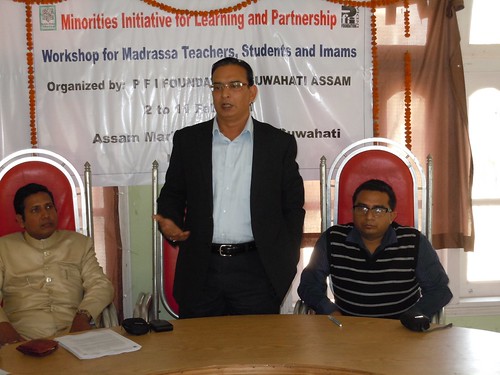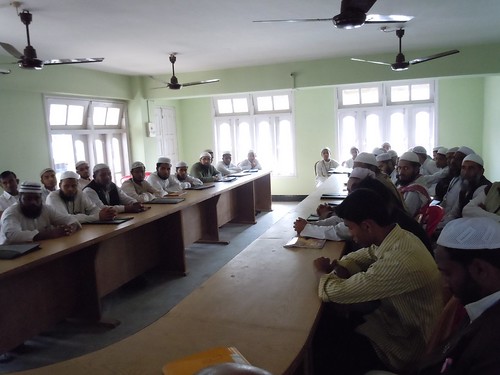By TCN News,
Guwahati: The 10-day workshop to train Madarsa teachers, students and Imams to enhance their skill for their respective field concluded on 11th Feb. here at Asom Markazul Ulum Madrassa, Guwahati. The ‘Minorities Initiative for Learning and Partnership’ program was organized by a Guwahati-based NGO – PFI Foundation – and sponsored by the British High Commission, New Delhi.
The program was inaugurated by Mr Mustaq Birader, Deputy Head of Mission, British Dy. High Commission, Kolkata on 2nd Feb.

Asad Mirza, Media Adviser,Brtish High Commission, addessing the participants
Seventy-five Madrasa teachers, students and Imams of Masjids from various parts of the state attended the training workshop. The teachers got special training on Teaching Methods while Imams were given special lessons on effective communication methods. Various topics were covered at the program including ‘Indian culture and religions’, ‘Constitutional & other Legal Rights of Minorities’, ‘Concept of knowledge in Islam’, ‘Indian religions & Culture’etc.
Highlighting the aim of the training program, Mr Asad Mirza, Press Adviser to British High Commission, New Delhi, said: “This program aims at to train a group of Madrasa teachers, Imams and students on
modern teaching methods and approaches, interfaith dialogue techniques, soft-skills for personal development and help them assume the roles of community leaders within wider civil society which will bring about positive and concrete change within local communities.”

A View of patticipants
In his speech, Dr Zahid Ali Khan, Nazim-e-Diniyat, Aligarh Muslim University, said: “After completing this training the Imams will be taking a pro-active role in introducing contemporary issues concerning the Muslim community in the wider civil society perspective through their Friday sermons. Imams will also lead inter-faith dialogues, discussions and meetings in their areas and assert their role as Community Leaders.”
The participants applauded the efforts as initiation to computers skills and communication techniques were a new experience to many of them who were basically religious teachers and students. They expressed need for more such programs to be organized in other parts of the state.
